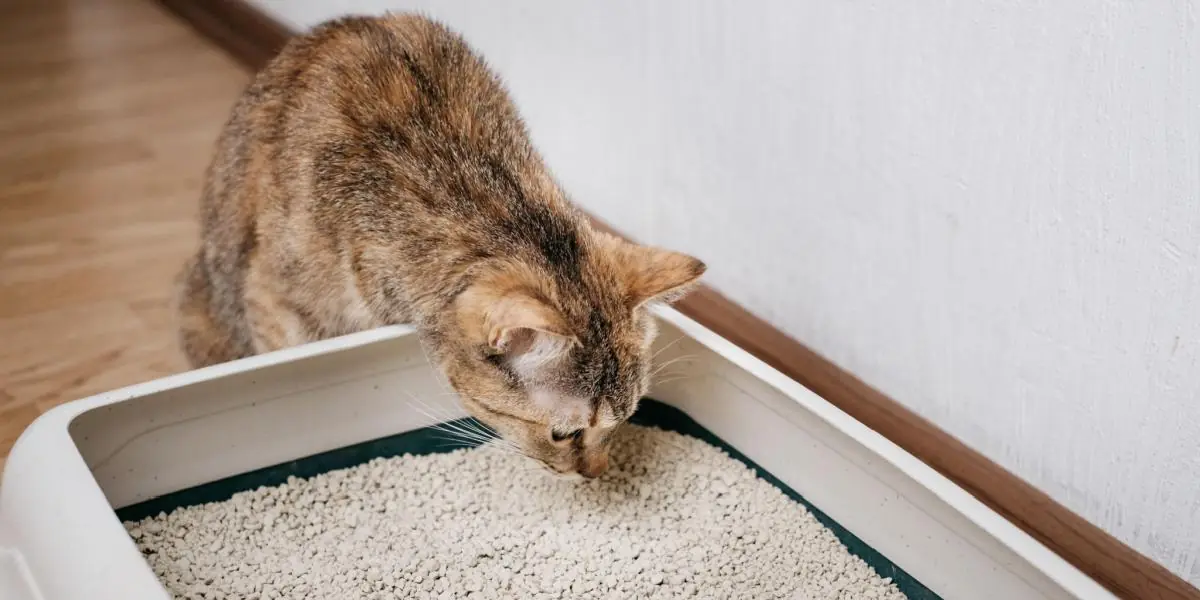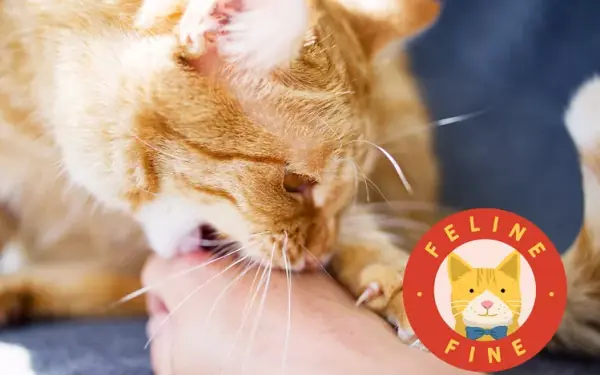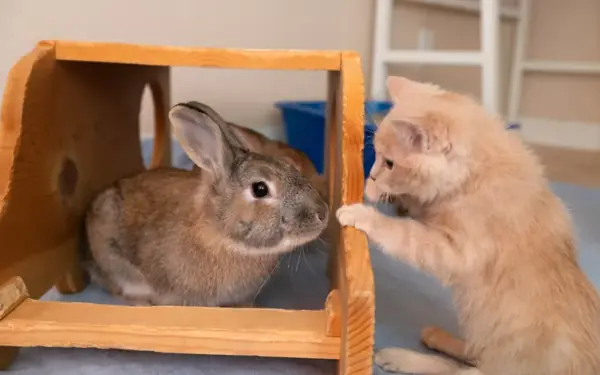
How Do Cats Know to Use the Litter Box? We've Got the Scoop
Your role in assisting a kitten or cat with litter box "training" involves providing appropriately sized litter boxes, positioning them in suitable locations, and filling them with cat-approved kitty litter. Thanks to advanced automated litter boxes, manual scooping may not even be necessary. Essentially, once the setup meets your cat's preferences, they will generally take to using the litter box without much instruction.
Indeed, teaching a cat to use her litter box doesn't require much effort compared to training puppies, who are often prone to accidents. How do cats instinctively know to use the litter box? It primarily stems from their innate feline instincts.

How Do Cats Automatically Know How to Use a Litter Box?
Whether they were raised alongside their mother and siblings or raised as an orphan with human care, felines have an innate instinct to relieve themselves in a place where they can conceal it. Stacie Lee Nyhuis, a Licensed Veterinary Technician at Behavior Solutions for Pets in Ashburn, VA, clarifies that in their natural habitat, cats bury their waste to prevent their scent from attracting predators.
Newborn kittens require stimulation to eliminate waste, but by the time they reach three to four weeks of age, they instinctively start using a litter box, albeit perhaps clumsily at first.

Nyhuis suggests that having another cat already using a litter box can aid in the process. However, cats are inherently inclined to dig and cover their waste. Thus, if you provide an appropriate litter box in a designated area, a cat or kitten should utilize it.
Stray cats transitioning from outdoor to indoor environments also possess the necessary knowledge, although they may initially prefer houseplants over a litter box. Encouraging adjustment involves removing access to houseplants and offering various litter boxes with different types of litter. Additionally, gradually introducing natural substrates such as dirt or sod alongside commercial kitty litter can assist in the transition process.
Are There Some Cats Who Won't Learn How to Use a Litter Box?
It's improbable that a cat isn't aware of how to utilize the litter box. Usually, there's an underlying issue that's dissuading your cat from using their designated area for elimination (more details on this later). However, Nyhuis suggests that some cats simply aren't proficient at concealing their waste.
"I can confirm this from my experience fostering a large grey tabby," she remarks. "He was quite messy!"
It's crucial to distinguish between a cat with poor aim—covering everything but their waste—and a behavioral shift such as not covering their waste anymore. "If they're eager to spend minimal time in the box, they might refrain from digging and covering it," Nyhuis elaborates.
If your cat is experiencing difficulties with the litter box, it's advisable to consult your veterinarian to explore potential solutions (hopefully alleviating stress for both you and your feline companion!).

Will My Cat Know Where the Litter Box Is If I Move It?
For cats with highly sensitive noses, locating the litter box becomes effortless when it's positioned in a convenient spot. To ensure your cat can easily access a clean bathroom, consider offering multiple litter boxes—Nyhuis advises having one box per cat, plus an additional one. In multi-level homes, distribute litter boxes across each floor, away from busy areas and loud appliances.
Nyhuis suggests avoiding physically placing your cat in the litter box, but rather encouraging them to discover it independently by engaging them with play or food and letting them find the box themselves.
Why Is My Cat Going Outside of the Litter Box?
Bathroom issues are a frequent occurrence when something isn't in order. As per the ASPCA, approximately 10 percent of all cats will exhibit elimination behavior outside their litter box at some stage in their lives. While it can be vexing to find your cat urinating or defecating outside its designated area, Nyhuis suggests viewing it as a means of communication indicating an underlying problem. If your cat is exhibiting this behavior, contemplate these potential reasons and arrange a discussion with your veterinarian.

Environmental
Cats are tidy and want a quiet, private place to do their business (don't we all?). Anything from the type of kitty litter, a dirty litter box, or the shape and size of the litter box could have your cat seeking an alternative bathroom location.
Behavioral
"Fear is a common cause of inappropriate elimination," Nyhuis says. Going to the bathroom is a vulnerable state for any animal—your happy house cat included. "If the cat has had a negative experience in or around the litter box, they're going to be apprehensive or uneasy to return to it."
Medical
Nyhuis suggests that alterations in urine patterns might stem from either a urinary tract infection or a condition impacting urinary function. For cats predisposed to urinary problems, proactively managing their urinary health with pH-adjusting litter is advised. Similarly, Nyhuis notes that deviations in bowel routines could arise from gastrointestinal discomfort, intestinal parasites, or overall stress. Any atypical bathroom behaviors warrant prompt veterinary assessment, as Nyhuis emphasizes the importance of early evaluation for safety precautions.
News in the same category


A Wedding Night That Changed Everything

2 things a man give you

Wife Refuses Divorce Because Her Husband Is "Too Handsome"

5 tiny signs someone has a crush on you

Boys' actions that girls like more than ma.ke lo.ve

The answer surprised many people

Who Is The Killer?

6 Reasons Cats Hate Water

Meowing Mayhem: Why Your Cat is Meowing So Much and What You Can Do About It

Why Do Cats Put Their Butt in Your Face? We Got to The Bottom of This Strange Behavior

Everything You Need to Know About Cat Body Language

Ouch! Why Does My Cat Suddenly Bite Me?

A Complete Guide to Flying With Your Cat on a Plane

Frankie, The One-Eyed Four-Eared Wonder: A Tale of Perfect Imperfection

Carrots the Blind Therapy Cat Awarded Medal for Helping Hospice Patients

This Kitten Is Learning How To Use His Back Legs After Moving in With a Group of Bunnies

New Study Suggests There's a Good Reason to Baby Talk to Our Cats

Indoor vs. Outdoor Cats: Should You Let Your Kitty Roam?
News Post

Science is hinting that eggs aren’t just breakfast - they could help protect your memory
Want a sharper memory? Adding an egg to your day might be a smart move

Health Experts Discuss the Benefits and Effects of Eating Okra
Medical Experts Share Insights on the Impact of Eating Okra

Doctors Warn: 3 Sleep-Related Symptoms at Night That May Signal Cancer
Waking Up With These 3 Nighttime Signs? Experts Say It’s Time for a Medical Checkup

6 Subtle Symptoms of Stomach Cancer to Watch for Early
6 Subtle Symptoms of Stomach Cancer to Watch for Early

Potential Health Risks of Excessive Pumpkin Seed Consumption
Think Pumpkin Seeds Are Always Healthy? Think Again

What You Should Know If You Often Take Daytime Naps
Do You Nap During the Day? Here’s What You Should Know

Muscle pain behind the knee, a dangerous symptom that should not be ignored
Posterior Knee Pain: When It May Indicate a Serious Condition

8 Plants That Might Increase the Chances of Snakes Visiting Your Property
8 Landscaping Choices That May Encourage Snakes to Hide Nearby

Is Tilapia Still Safe to Eat? What You Should Know
The Truth About Tilapia: Is It as Healthy as You Think?

10 Social Habits Commonly Misunderstood as Rude but Associated with Intelligence
10 Habits Often Seen as Rude That May Reflect Intelligence

The 3 “Dirtiest” Parts of Chicken: What You Should Know Before Eating
Are These Chicken Parts Safe to Eat? What Experts Say

Ongoing Ringing in the Ears Could Signal an Underlying Issue
Frequent Ringing in the Ears? Here’s What It Could Indicate

What Does a Mole on Your Lip Mean? Symptoms and Warning Signs
Understanding Moles on the Lip: Possible Causes and Concerns

Early Signs of Skin Cancer: The Significance of a Large or Changing Spot
Got a Large Spot on Your Skin? Here’s What You Should Know

Seeing Strange Bruises on Your Body? Read This First
Seeing Strange Bruises on Your Body? Read This First

When Are Swollen Lymph Nodes in the Neck a Cause for Concern?
Clinical Red Flags for Swollen Lymph Nodes in the Neck

Spot These 10 Early Red Flags of Kidney Disease Before It’s Too Late
Spot These 10 Early Red Flags of Kidney Disease Before It’s Too Late

You’ll Be Surprised by the Nutritional Power of This Vegetable
Once Ignored, Now Celebrated: The Wild-Growing Vegetable Being Called a “Miracle Herb” for Health

Discover the Plant That Can Purify Your Blood, Renew Your Skin, and Cleanse Your Organs — But Only If You Use It This Way
It’s as if your body is quietly asking for a break — not another diet, not another supplement, but something deeper.

Why Cats Leave Home and Don’t Return
Cats are curious, independent creatures—and while that’s part of their charm, it can also be the source of stress when one suddenly disappears.